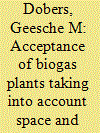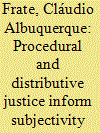|
|
|
Sort Order |
|
|
|
Items / Page
|
|
|
|
|
|
|
| Srl | Item |
| 1 |
ID:
169876


|
|
|
|
|
| Summary/Abstract |
As part of Germany's energy transition, enormous efforts are being made to transform the German energy supply to renewable energies. While much of the energy supply from renewables is wind and solar power, biogas contributes on third position a considerable share due to substantial state subsidies. The transformation to renewable energies leads to notable landscape changes that should be taken into consideration when studying the acceptance of renewable energy plants. We do this by adding spatial information to data from an online survey (N = 942) questioning the acceptance of biogas plants. The density of and proximity to existing biogas plants as well as the intensity of maize cultivation in the vicinity of respondents is integrated into the analysis together with more conventional influencing factors such as place attachment and attitudes. Results show that attitudes have the strongest explanatory power but spatial variables, particularly maize intensity, contribute significantly, too. Place attachment does not show reliable effects. The results demonstrate that spatial data can be useful in the analysis of survey data, for instance, in an environmental context. They also show that diversification of the raw materials used for fermentation in biogas plants might be an important factor in improving their acceptance.
|
|
|
|
|
|
|
|
|
|
|
|
|
|
|
|
| 2 |
ID:
162944


|
|
|
|
|
| Summary/Abstract |
The use of auctions for determining the level of renewable energy remuneration is increasing. A cause for concern is the resulting potential to exclude smaller investors from the market, in particular community energy projects. However, empirical evidence and examination of resulting consequences have been insufficient so far. This article analyses the effects a shift from guaranteed remuneration to auctions might have on incentives to start new community wind projects, analysing the case of Germany. It thus contributes to research on investor-specific impacts of renewable energy policy instruments. An explanatory sequential mixed-method design was applied, combining surveys and interviews for the collection of expert assessments. The developed typology allows the assessment of the respective potential of different wind project types for procedural and distributive justice, which are understood to support local acceptance. Wind projects developed by the local community were found to be most beneficial for local acceptance, but appear to face the highest challenges in auctions. A crowding out of these projects would be particularly unfortunate with regard to the need to expand wind energy capacities much more. It is recommended that policy makers ensure a level playing field, also within the context of auctions, for wind projects developed by the local community.
|
|
|
|
|
|
|
|
|
|
|
|
|
|
|
|
| 3 |
ID:
166961


|
|
|
|
|
| Summary/Abstract |
Energy planners predict that in Brazil wind power will increase from 13.19 GW in 2018 to 28.47 GW in 2026. Conflicts focused on wind farms are appearing in Brazil, but thus far a justice perspective has not been applied to analyze conflicts. Increasingly, wind power acceptance is positively associated with several concerns regarding procedural and distributive justice, but empirical descriptions of how social actors interpret these concerns is in early stages. Identification of issues influencing acceptance is necessary to devise policies to facilitate wind power diffusion. This paper uses Q-method to determine empirically four factors or social perspectives in a coastal community in Rio Grande do Norte state: (1) Questioning Wind Power Benefits; (2) Wind Farm Boosters; (3) Compensated by Power and (4) Questioning Wind Farm Processes. Procedural and distributive justice concerns, especially the distribution of perceived benefits and negative impacts of wind farms and critiques of the decision-making processes, structure these social perspectives. Identification of social perspectives may improve decision-making process capacity for procedural and distributive justice.
|
|
|
|
|
|
|
|
|
|
|
|
|
|
|
|
| 4 |
ID:
149936


|
|
|
|
|
| Summary/Abstract |
Growing awareness of the potential for some energy-related activities to induce earthquakes has created a need to understand how the public evaluates the risks of induced earthquakes versus the benefits of energy development. To address this need, this study presents a web survey that used a between-subjects factorial experimental design to explore the views of 325 U.S. adults, who were asked about their experiences with earthquakes; risk perceptions related to different causes of earthquakes (e.g., natural versus induced); and acceptability of earthquakes depending on the benefits, beneficiaries, and decision making process. The results found that participants had more negative feelings toward induced versus naturally occurring earthquakes. Although they judged no earthquake as “acceptable,” participants rated induced earthquakes significantly less acceptable than naturally occurring ones. Attributing the benefits to the provision of renewable energy or climate change mitigation did not increase induced earthquake acceptability, and no particular beneficiary made earthquakes more acceptable, although private companies as beneficiaries made earthquakes less acceptable. Finally, induced earthquake acceptability was significantly higher when people believed that people like them had a voice in the decision to implement the technology that caused the earthquake, underscoring the importance of public engagement in the development of energy technologies.
|
|
|
|
|
|
|
|
|
|
|
|
|
|
|
|
| 5 |
ID:
168321


|
|
|
|
|
| Summary/Abstract |
Energy transition towards a sustainable system comprising various energy sources is a major challenge. We conducted a representative survey in the German-speaking part of Switzerland to elicit the population's preferences for electricity from solar, wind or natural gas under different institutional and site-specific conditions. Based on a choice experiment we found a consistent preference for electricity based on solar energy and - to a lesser degree - wind energy, built in existing industrial and commercial areas. We identified five distinct population groups, three of which have a very pronounced profile concerning energy attributes: ‘Pro Renewables', ‘Pro Switzerland’, and ‘Pro Landscape’. The largest two groups, 'Moderates' and ‘Contra Status Quo’ value attributes fairly equally. All groups except Pro Landscape prefer electricity from Switzerland, and all groups except Pro Switzerland accept imports of renewable electricity, preferably from plants operated by Swiss firms. We suggest that unfamiliarity rather than nationalism is at the root of opposition to imports of renewables. An energy mix focusing on renewables and including border-crossing electricity infrastructure could pave the way for a cost-efficient energy transition towards a sustainable and resilient electricity system. Our results show that it would also be publicly acceptable by the majority of the Swiss population.
|
|
|
|
|
|
|
|
|
|
|
|
|
|
|
|
| 6 |
ID:
187595


|
|
|
|
|
| Summary/Abstract |
Community ownership of wind energy has been found to increase acceptance, but the reasons for this are poorly understood. Here, we compare different communities’ attitudes towards local onshore wind energy projects in order to gain a deeper understanding of the characteristics of ownership which are conducive to community acceptance. Using a postal survey in Scotland (n = 318), we compared three communities with varying degrees of ownership regarding their (1) support for the local wind project; (2) perceptions of energy justice; (3) perceived impacts; and (4) ownership and benefit preferences. One-way ANOVAs and the Potential for Conflict Index2 identified that residents in the two communities with a degree of ownership were more associated with greater acceptance, processes, and outcomes (i.e. more just and inclusive development processes and more fairly distributed benefits and impacts), than residents living near the privately-owned development. Additionally, we provide evidence that a co-operative can achieve similar acceptance and energy justice as a fully community-owned project. Overall, the results indicate that policymakers should take seriously the connection between the tenets of energy justice and ownership models in their policy and planning efforts.
|
|
|
|
|
|
|
|
|
|
|
|
|
|
|
|
| 7 |
ID:
132670


|
|
|
|
|
| Publication |
2014.
|
| Summary/Abstract |
The nuclear accident in Fukushima and the subsequent discussions about nuclear power influenced public acceptance of this technology. The aim of the present study was to examine why after the Fukushima accident some people converted from supporting nuclear power to opposing it or became undecided. Data from a longitudinal telephone survey with two measurement points were used. The first survey was conducted about 15 months before the accident in Fukushima and the second survey was conducted about 20 months after. The sample consisted of 561 respondents from the German- and French-speaking regions of Switzerland. Results suggest that changes in benefits perception were mainly responsible for people×s changes in attitude toward nuclear power. People perceived somewhat more risks related to nuclear power after the accident in Fukushima. This change in risk perception did not explain the attitudinal changes of proponents into opponents of nuclear power, however.
|
|
|
|
|
|
|
|
|
|
|
|
|
|
|
|
|
|
|
|
|